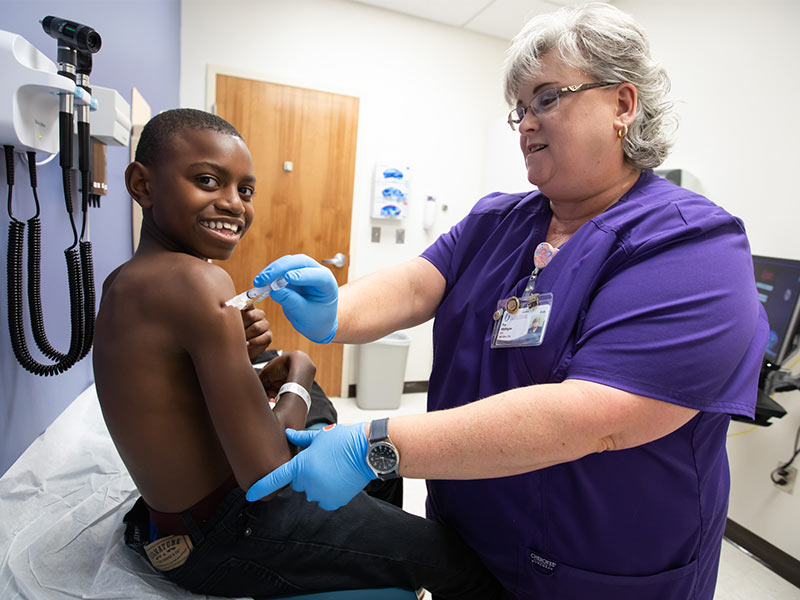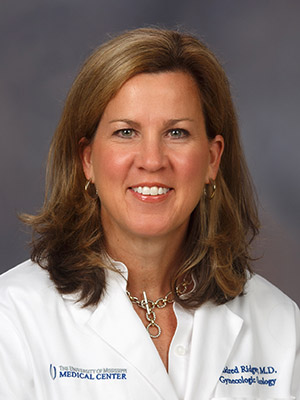UMMC experts: Raising recommended HPV vaccine age range could save lives

The use of the Gardasil vaccination to protect both men and women from the human papillomavirus, HPV for short, has saved thousands of lives, and now is poised to save even more.
First approved for use in youths and young adults ages 9-26, Gardasil 9 is the newest generation of the vaccine that was authorized by the U.S. Food and Drug Administration in 2006 to prevent certain cancers and diseases caused by HPV. The FDA earlier this month expanded the age range upward to 45 for both men and women.

“This is definitely a positive thing,” said Dr. Mildred Ridgway, a gynecologic oncologist and assistant professor of obstetrics and gynecology. “The impact that the HPV vaccine can have on the reduction of cervical cancer rates is phenomenal.”
The recommendation is based on new data, including that from a study of about 3,200 women ages 27-45 who received the Gardasil 9 vaccine. That study showed the vaccine was 88 percent effective in preventing cervical cancer related to the types of HPV covered by the vaccine, along with preventing a number of other HPV infections and precancerous lesions.
The FDA recommendation “represents an important opportunity to help prevent HPV-related diseases and cancers in a broader age range,” Dr. Peter Marks, director of the FDA’s Center for Biologics Evaluation and Research, said in a news release announcing the change.
“The Centers for Disease Control and Prevention has stated that HPV vaccination, prior to (a person) becoming infected with the HPV types covered by the vaccine, has the potential to prevent more than 90 percent of these cancers, or 31,200 cases every year, from ever developing.”
Nearly 80 million people in the United States are living with HPV, or one in four, the CDC estimates. About 14 million people become infected with HPV each year. Most never develop symptoms or health problems, and nine out of 10 infections go away by themselves within two years.
But if they don’t, they can cause cancers that include cancers of the cervix, vulva and vagina in women; cancers of the penis in men; and in both sexes, cancers of the anus, back of the throat, base of the tongue and tonsils.
Targeting the older age group for the vaccine to reduce cancer risk is “absolutely the best front-line approach,” Ridgway said.
“Increasing the age range all the way to 45 will include a population that was originally missed,” she said. “It’s still a population that can and will be exposed to HPV. Men and women have new sexual encounters and exposure to HPV.”
Although upping the age for the vaccine is powerful, research shows that the earlier someone gets immunized – as young as ages 11-13 – “the better off your immune system response is,” said Dr. Sara Weisenberger, associate professor of pediatric medicine.
Increasing Mississippi’s HPV vaccination rate in adults through age 45 could be a challenge based on existing rates for ages 13-17. Just 24.5 percent of boys in that range received the vaccine in 2016, the most recent figures available from the American Cancer Society show, putting the state in 49th place.
For girls, it was 33.9 percent, or 50th place.
“We are constantly pushing it,” Weisenberger said. “The earlier you get it, the better off you are. We don’t want them to have any exposure whatsoever, or to become sexually active before they get the vaccine.”
Her clinic advises parents to have their children vaccinated for HPV at the same time they get the Tdap and meningitis B immunizations. The Tdap, which protects against diphtheria, tetanus, pertussis and polio, is required by the Mississippi State Department of Health for students by the time they enter seventh grade. The HPV and meningitis vaccines are strongly recommended.
“We tell patients that you’re already here, so let’s get it all done at the same time,” Weisenberger said. Immunizations also can be spaced if parents feel more comfortable doing that, she said.
In her practice, Ridgway sees women coping with cervical cancer, many of them between ages 27-45, who didn’t get the HPV immunization.
“Worldwide, there’s already a reduction in cervical cancer rates, especially in countries that have better vaccination penetration rates,” she said. “In the United States, we’re still behind on that, although some parts of the country are doing better than others.”
Ridgway and Weisenberger want patients and families to know that the HPV immunization will save lives.
Every year in the United States, HPV causes about 42,700 cancers in men and women, the CDC says. In general, HPV is thought to be responsible for 91 percent of both cervical and anal cancers and 75 percent of vaginal cancers. About 4,000 women die each year from HPV-caused cervical cancer.
MSDH doesn’t keep statistics on how many deaths from HPV-related cancers occur in people who aren’t vaccinated. But in Mississippi, out of 100,000 people who develop cancer annually, 14.39 will be associated with HPV, the CDC says. That’s one of the highest incidences of HPV cancers in the nation and has risen steadily from 8-9.5 cases associated with HPV in 2010.
“Increasing the age range for the vaccine is a progressive and forward move to continue to decrease cervical cancer,” Ridgway said.
In her clinic, “we don’t have problems with people denying the HPV vaccine,” Weisenberger said. “We are fortunate.”


